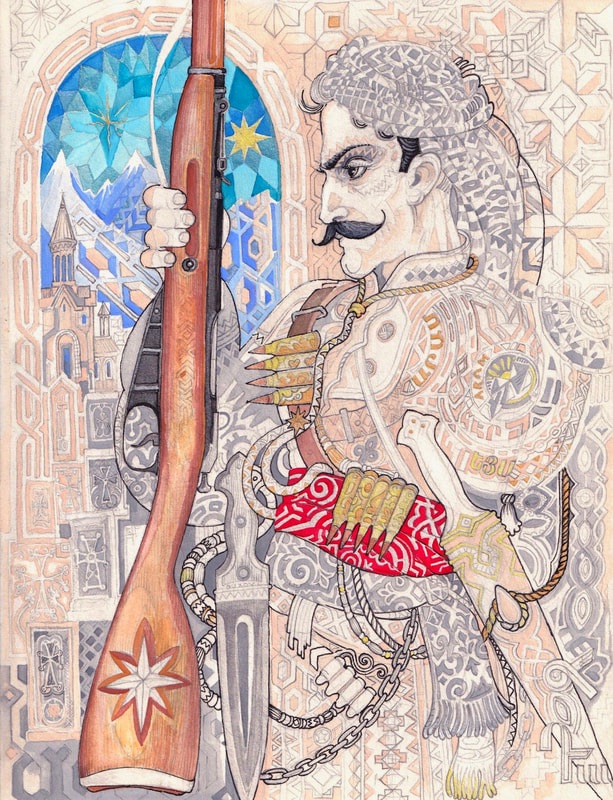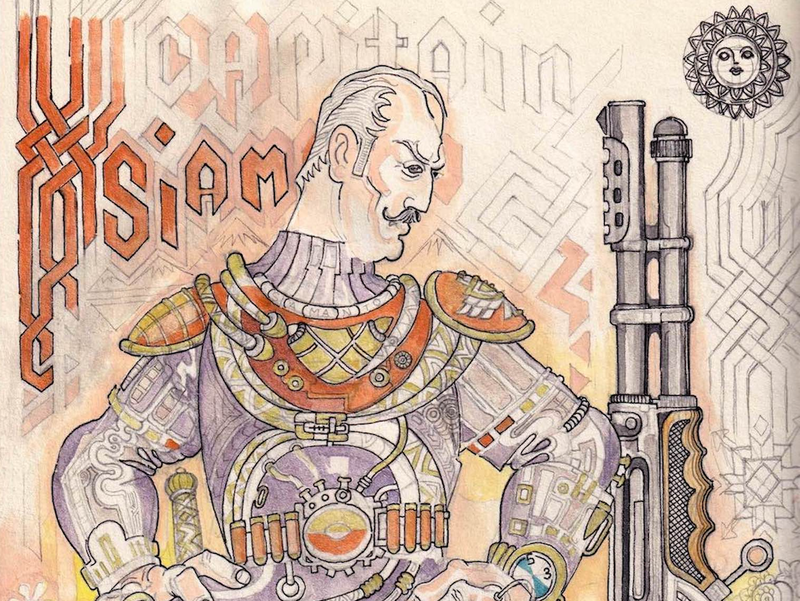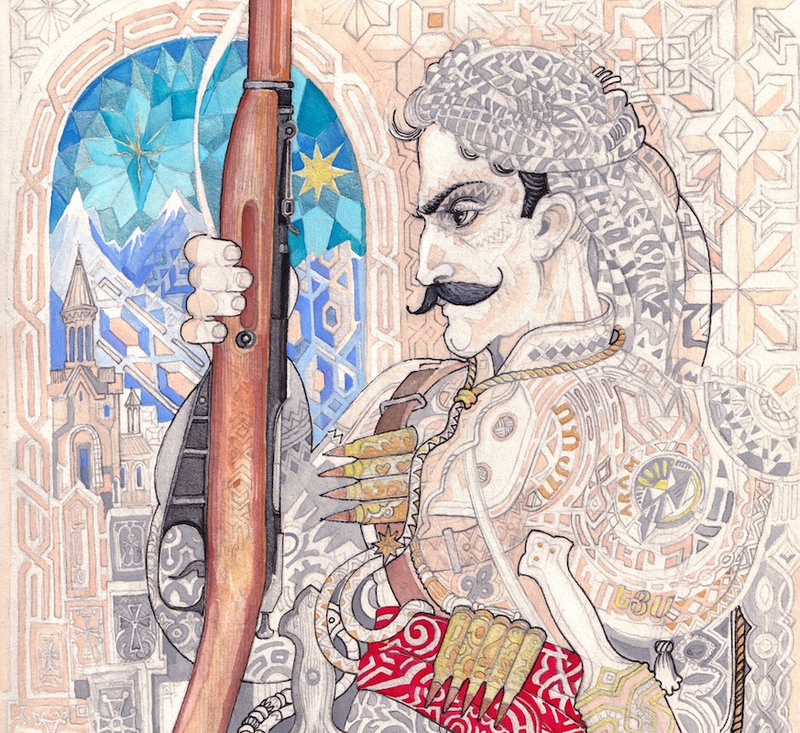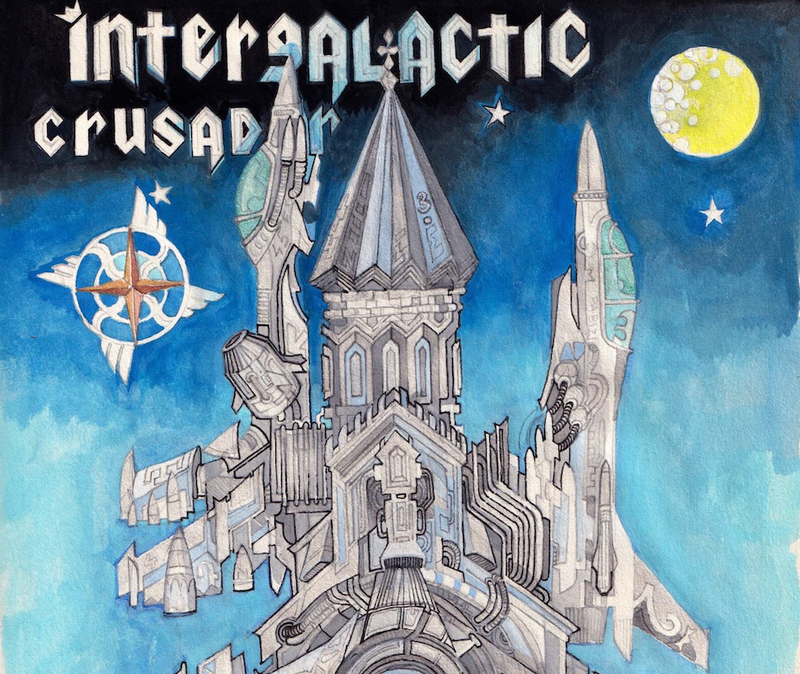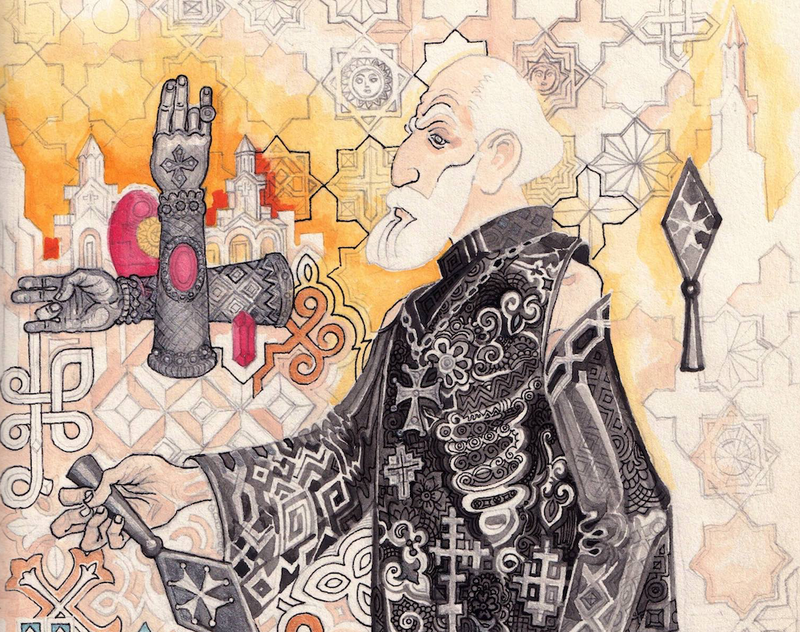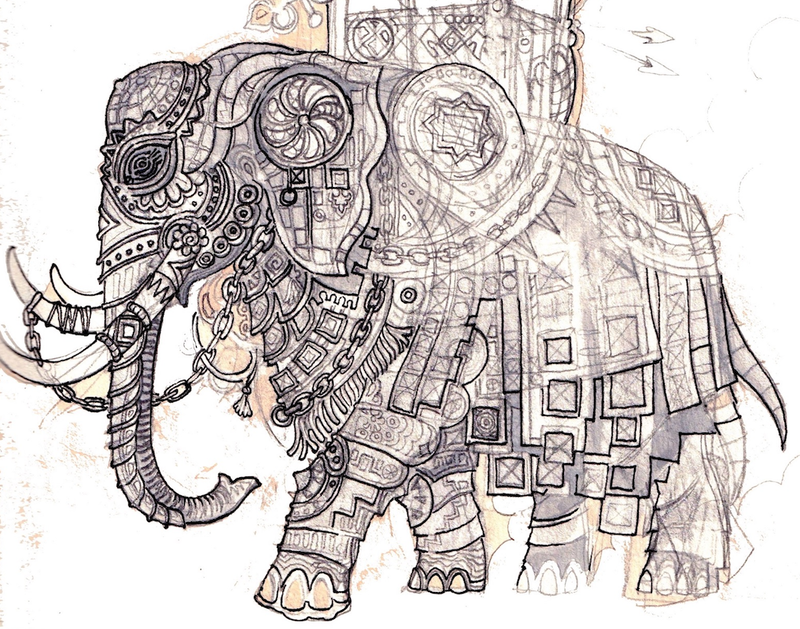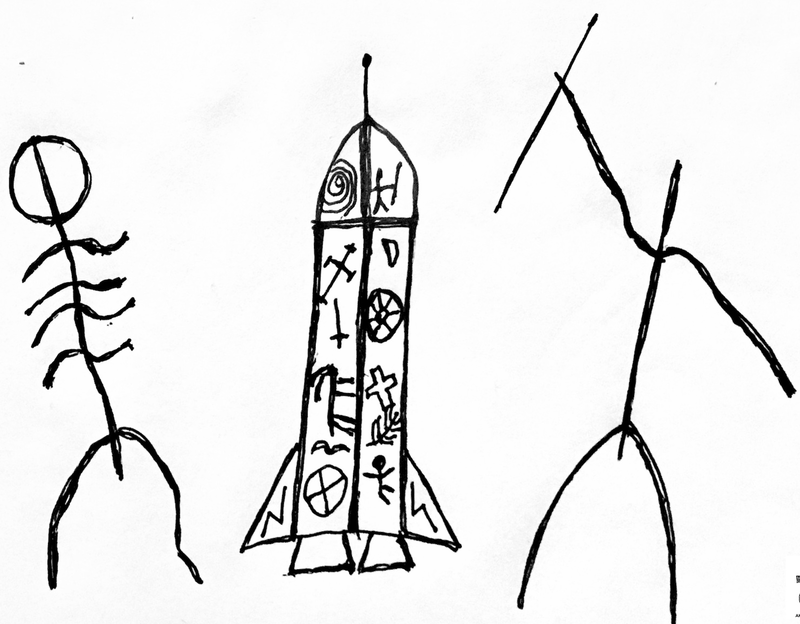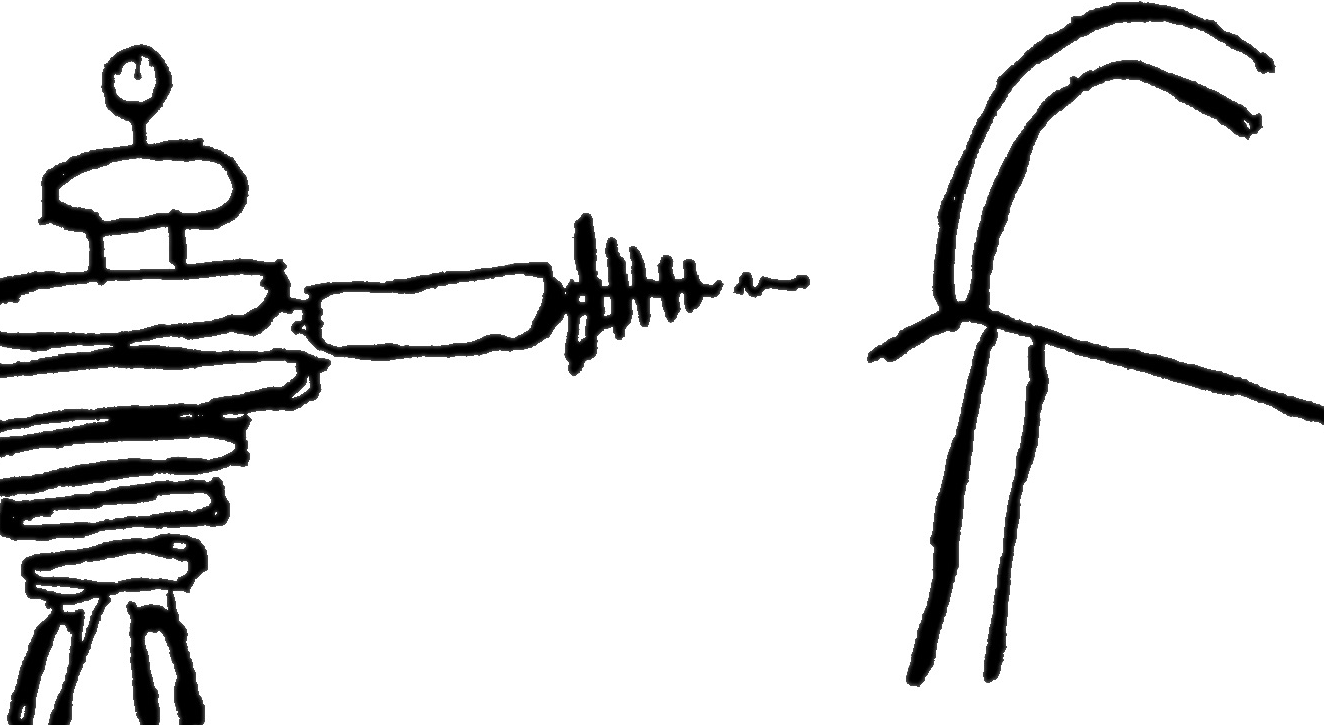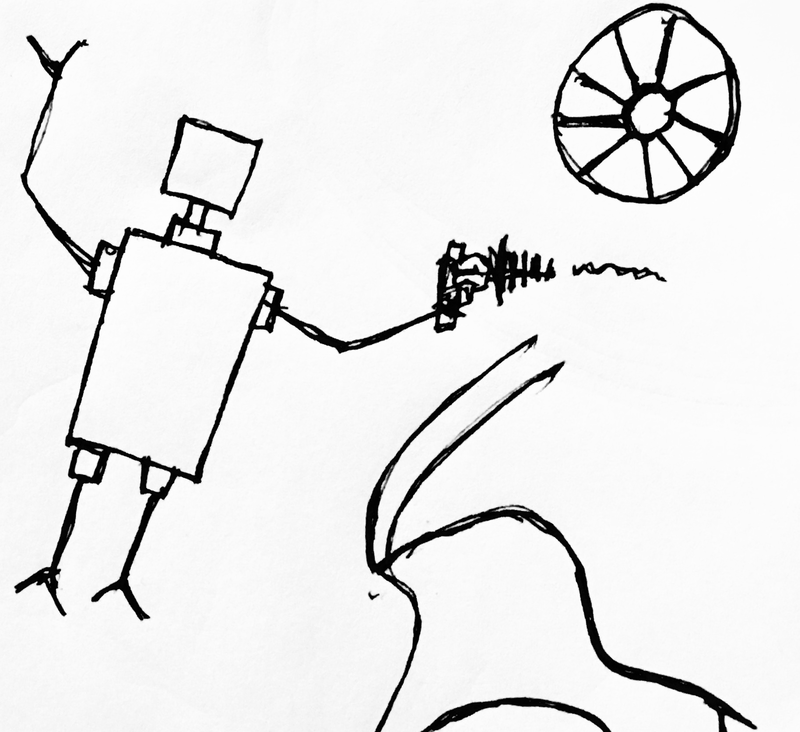ORIGINAL ARTWORK © DAVID MKRTCHYAN
(Excerpt...)
THE PRINCE
Aramais Hampartsoum Kenderian stood near the furnace watching the mixture of silver and antimony melt in the crucible.
"Maybe this batch will be better," he thought as he watched the white metal pool upward into glowing reds and grays.
He scooped flotsam off the surface with a tool he'd fashioned for just that purpose made of fine steel left over from forging Arin's sword and the dagger. He, then, dropped in just the right amounts of lead and copper, as per his calculations, and stirred the combination slowly, then carefully pulled the now white-hot stirring rod from the mix.
He picked up the tongs with his gloved hands and gripped the glowing crucible, lifting it from the fire and poured the alloy gently into special molds he had made for ten .30 caliber bullets he would later crimp into 10 powder-filled, brass shells he had put aside just for this occasion.
He let the metal-filled molds cool and was about to call out to his son, Karekin, to bring him some water when he realized, once again, that his son was dead.
And, for that matter, so were his wife and daughter, his mother and father, and almost everyone he had ever known.
This would happen periodically--his body and soul would dominate his conscious mind, subverting reality, and make him call out for his loves. At first, he had sobbed uncontrollably after each mistaken moment and utterance, then after some time the sobbing turned to an anger that knew no end.
But, now, he took it in some sort of stride and was, in fact, thankful that the universe and the great Lord above allowed him to think, even for a millisecond, that they were all still alive.
However, Aramais increasingly felt somehow between worlds, between realities--not just between past and present. He began having inexplicable feelings that there was more--more worlds, more realities--swirling around him from both near and far, and that he was fully present in them all, yet somehow traveling between them.
He knew not what this meant.
Instead of calling out another dead loved one's name, the Prince, as Aramais was now known for some time, picked up the large wooden mallet from the workbench and struck each of the molds, breaking them clean and began fishing the silver-alloy nuggets from the rubble and ruin of clay. He collected the projectiles in his now bare and calloused hands, rubbing them and preparing them for use.
The newly cast bullets were created for a special purpose--so special that the Prince fabricated them by his own hand, using his wedding ring, the children's baptismal crosses, and the baby's rattle as fodder.
Oh, dear Lord, the poor baby was dead, as well...
Aramais' subconscious always tried to forget his infant daughter's death whenever possible because it and he hated remembering this the most.
The Prince had fabricated countless bullets, as well as bombs, grenades, even primitive mortars, since the beginning of all the horrors. He had also been forced to fire many of these rounds into the craniums and skulls, the torsos and hearts of the murderers and monsters that had killed not only his family, but, kept killing his people and continued hunting down the Prince and his comrades.
News from the big cities and foreign sources placed the number murdered in the Armenian Highland by the Turkish Government and its minions at more than a million and a half.
That unimaginable quantity of suffering did not include the crippled, the maimed, the sick and sickened, the starving, the broken, the mad, the enslaved--the forever walking wounded, nor the forever living dead.
It also did not include the still continuing onslaught against the innocent all over what was once Armenia and beyond.
Yes, he was the Prince now--at least that's what they called him, although rarely to his face.
In fact, he was rarely even called Aramais anymore or Baron (Mr.) Kenderian for that matter, either. Children no longer asked "Baron Kenderian" how to write the letters of the Armenian alphabet with flourishes and ornamentation like in the manuscripts. They no longer raised their hands excitedly to answer or ask burning questions, and they no longer played in the pasture under his watchful and loving gaze with toys he had made for each of them.
They no longer asked Mr. Kenderian if they could have class by the ruins of the old fortress, again, and have him tell them stories of ancient battles and great kingdoms, about how the Armenians were able to become who they were after 12,000 years or what those symbols on old man Hovo's cave walls meant and how beautiful they were--those hunters with spears and the great-horned rams they would still see, stern-eyed, climbing crags and gorges near the monastery.
Aramais Hampartsoum Kenderian stood near the furnace watching the mixture of silver and antimony melt in the crucible.
"Maybe this batch will be better," he thought as he watched the white metal pool upward into glowing reds and grays.
He scooped flotsam off the surface with a tool he'd fashioned for just that purpose made of fine steel left over from forging Arin's sword and the dagger. He, then, dropped in just the right amounts of lead and copper, as per his calculations, and stirred the combination slowly, then carefully pulled the now white-hot stirring rod from the mix.
He picked up the tongs with his gloved hands and gripped the glowing crucible, lifting it from the fire and poured the alloy gently into special molds he had made for ten .30 caliber bullets he would later crimp into 10 powder-filled, brass shells he had put aside just for this occasion.
He let the metal-filled molds cool and was about to call out to his son, Karekin, to bring him some water when he realized, once again, that his son was dead.
And, for that matter, so were his wife and daughter, his mother and father, and almost everyone he had ever known.
This would happen periodically--his body and soul would dominate his conscious mind, subverting reality, and make him call out for his loves. At first, he had sobbed uncontrollably after each mistaken moment and utterance, then after some time the sobbing turned to an anger that knew no end.
But, now, he took it in some sort of stride and was, in fact, thankful that the universe and the great Lord above allowed him to think, even for a millisecond, that they were all still alive.
However, Aramais increasingly felt somehow between worlds, between realities--not just between past and present. He began having inexplicable feelings that there was more--more worlds, more realities--swirling around him from both near and far, and that he was fully present in them all, yet somehow traveling between them.
He knew not what this meant.
Instead of calling out another dead loved one's name, the Prince, as Aramais was now known for some time, picked up the large wooden mallet from the workbench and struck each of the molds, breaking them clean and began fishing the silver-alloy nuggets from the rubble and ruin of clay. He collected the projectiles in his now bare and calloused hands, rubbing them and preparing them for use.
The newly cast bullets were created for a special purpose--so special that the Prince fabricated them by his own hand, using his wedding ring, the children's baptismal crosses, and the baby's rattle as fodder.
Oh, dear Lord, the poor baby was dead, as well...
Aramais' subconscious always tried to forget his infant daughter's death whenever possible because it and he hated remembering this the most.
The Prince had fabricated countless bullets, as well as bombs, grenades, even primitive mortars, since the beginning of all the horrors. He had also been forced to fire many of these rounds into the craniums and skulls, the torsos and hearts of the murderers and monsters that had killed not only his family, but, kept killing his people and continued hunting down the Prince and his comrades.
News from the big cities and foreign sources placed the number murdered in the Armenian Highland by the Turkish Government and its minions at more than a million and a half.
That unimaginable quantity of suffering did not include the crippled, the maimed, the sick and sickened, the starving, the broken, the mad, the enslaved--the forever walking wounded, nor the forever living dead.
It also did not include the still continuing onslaught against the innocent all over what was once Armenia and beyond.
Yes, he was the Prince now--at least that's what they called him, although rarely to his face.
In fact, he was rarely even called Aramais anymore or Baron (Mr.) Kenderian for that matter, either. Children no longer asked "Baron Kenderian" how to write the letters of the Armenian alphabet with flourishes and ornamentation like in the manuscripts. They no longer raised their hands excitedly to answer or ask burning questions, and they no longer played in the pasture under his watchful and loving gaze with toys he had made for each of them.
They no longer asked Mr. Kenderian if they could have class by the ruins of the old fortress, again, and have him tell them stories of ancient battles and great kingdoms, about how the Armenians were able to become who they were after 12,000 years or what those symbols on old man Hovo's cave walls meant and how beautiful they were--those hunters with spears and the great-horned rams they would still see, stern-eyed, climbing crags and gorges near the monastery.
They were all gone--murdered--and he had become someone else. He had become the Prince--an incarnation of an Aramais he had never known.
His hands were hard and raw now, no longer caressing the gossamer wings of butterflies or the spiny petals of blue-thorned flowers but, rather, they machined metal into weapons of justice and violence, or squeezed the last throes of life from the body of the Butcher of Trabzon--the murderer of tens of thousands of children--as he had been forced to do not so long ago.
Now, they called him "Unger" (Comrade...), they called him "Hramanadar" (Commander...), they called him "Harvester of Souls" behind his back, but they never could look into his eyes for more than a few seconds at a time. These were not the gentle children of the classrooms and pastures, but their orphan fathers and older brothers--the motherless, the widowed, the bereft avengers.
Even his brothers-in-arms, his own comrades, spoke to him, most often, eyes averted for fear they would well-up with tears and burning love if their gazes were to meet and last any longer than a few seconds.
That's how horrible things had gotten--no time for weakness or perceptions thereof.
No time to mourn and lament losses--not yet.
All was gone and these Orphan Kings of Western Armenia were, now, the voices of the countless dead and defenders of those still somehow living, fighting a bloody onslaught unleashed by a Godless and inhuman evil.
The Prince sat down on a remnant swath of ancient Armenian carpet he had rescued from the blaze that had consumed his family home. It now lay upon a wooden bench near the table and the old stove. As he sat, the holstered Dasnots at his side found its natural place--barrel length pointing back along the outside of his right thigh towards the bench, and the handle above, encased in the wooden stock/holster (as was the rest of the pistol), rested hard above his hip. The Prince reached for the kettle and filled his glass with tea as he let a procession of visions from what seemed a long-gone, peaceful past make its way across his mind and heart. He, then, brought forth--one by one--new memories from the future he would create.
This is how he stayed alive.
This is how he kept breathing.
This is how he kept fighting--by remembering his past and his future.
The Prince had risen swiftly within the ranks of a special group of stalwart fighters, a class of warriors whose code of conduct--operational and moral--had no equal. He distinguished himself with acts of bravery, self sacrifice, and kindness without ever really allowing himself to wallow in the meaning of his victories, not really knowing what he had done--only knowing what had to be done.
He had become the regional commander for insurgent forces in the province and, now, was responsible for special operations and acts of justice across the region.
His men swore their lives upon only two things--the sacred red seal of the Party and upon the awe-filled name of the Prince.
As long as they were alive, the Prince and these Justice Commandos of the Armenian Genocide would relentlessly continue their struggle against oppression, fighting for justice and peace in a world that was crumbling before their very eyes.
--akm
© Ara Mgrdichian
